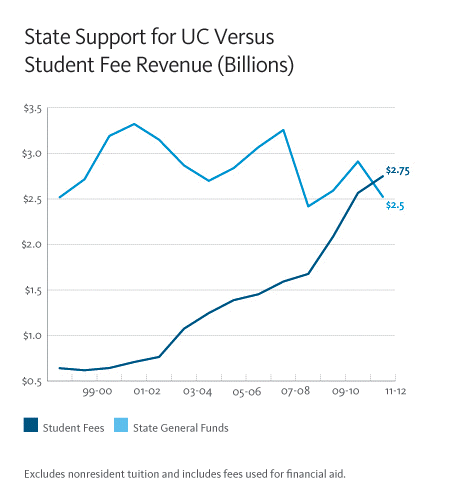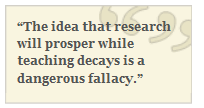
Leland Stanford, Sr
While Mediocrity Reigns

A matter of time
|
Opinion- 15 January 2011 |
|
Leland Stanford, Sr |
While Mediocrity Reigns |
 A matter of time |
When the newly elected governor of California (actually it's his second coming), Jerry Brown, got down to work, one of his first acts was to inform the ten campus University of California system that it had to cut $500,000,000 (16.4%) out of its state government funding. As is shown by the chart below student fees will, for the first time in the University of California's 143-year history, exceed the state's contribution toward financing the the UC campuses.

To be fair UC has not been singled out for the knife; the governor's budget also includes a $500 million cut to the California State University system and a $400 million cut to the California Community College system, resulting in a more than $1.4 billion reduction in state support for California's three public higher education systems.
Currently it is estimated that over the next 20 months, the gap between state revenue and expenditures will reach $25 billion.
Now you might think that you don't screw one of the miracles that your state created -- a planetary leader in research and learning -- through simultaneous intellectual castration and hysterectomy, to achieve scholarly sterility; it being the ultimate in short-sightedness. But you would be wrong, and from a political viewpoint, naive.
This is the way a UC faculty member put it:
It's hard to know what the right thing to do is.
Personally I feel that any country that cuts its expenditure on higher education
like California (California is, as the UC President has implied, effectively a
country) or the UK are doing is very seriously risking its economy in the future.
However, there are those who say that almost every country in the future will
embrace a much more market-oriented education system; that in the future we
should expect to pay a lot for our education. Ironically this is true today even
in some of the Asian economies that are held up as shining examples of
government expenditure on education. For example, getting a university education
in China is so far out of economic reach for most people there that it is an
impossible dream for the great majority of young Chinese men and women.
However, that's not true in Singapore,
for example.
Inside California many people feel that they are already paying much too much
tax, and they will welcome almost any reasonable scheme that means they will pay
less in the future. It costs far more per day to keep a prisoner in a
Californian jail than to send him to a UC campus, so you could free prisoners --
but taxpayers won't accept that.
Outside California there is little sympathy for the state; most states spend much less on their education systems, and there is a feeling that California should get its act together.
There followed a tongue-in-cheek reference to the 1891 opening of Leland Stanford, Jr. University founded by the tycoon, robber-baron industrialist, politician Leland Stanford in honour of his son.
I just don't know. I expect that this is a good time for a wealthy businessman
or woman to endow a modest private university in California. They should start
small, of course; if the endowment is careful then their name will live long.
Which brings us to the approach of Australia's political
leaders in their inexorable march to reliance on international student fees to
prop up university expenditures, and the defects and intellectual corruption as a consequence.
intellectual corruption as a consequence.
One aspect of the effect of mediocre political leadership is now becoming apparent in Great Britain. Colin Macilwain in his "World View" column for the January 12 issue of Nature makes the assertion: "Scientific leaders [in the UK] have been too quick to praise the reprieve for research money. The slashing of teaching funds will do real damage" and he decries the fact that "[w]hile governments defend research spending, they are simultaneously slashing public funding for universities, where most research takes place".
Mr Macilwain then goes on to quote from an article by Geoffrey Boulton of the University of Edinburgh and Colin Lucas, former vice-chancellor of the University of Oxford: "What are Universities For?" They argue that the thrust of higher-education policy in many countries is "squeezing out diversity of function and undermining teaching and learning... slipshod thinking about universities is leading to demands that they cannot satisfy, while obscuring their most important contributions to society and undermining their potential".
As Mr Macilwain sees it, with the advent of the Global Financial Crisis: "as Western governments attempt to maintain investment in science as a route to innovation and industrial development, they are undermining support for students and the quality of their education. Instead of joining with students and teaching staff elsewhere in academia in protest, too many scientific leaders have stood aloof (Martin Rees, until this month president of the Royal Society in London, is a notable exception). Strategically, this approach is a disaster in waiting."
And the disheartening conclusion -- emphasis on student education as their bedrock of energy and ideas [i]n the United Kingdom and elsewhere... are being demolished, and students drowned in debt, to keep researchers' grants flowing. It can only end badly, and more in the scientific establishment should have the courage to say so.
We would add that it past time for our nation's backbenchers, state and federal, to look past the fringe of the carpet when discerning the good of their constituents.
Alex Reisner
The Funneled Web